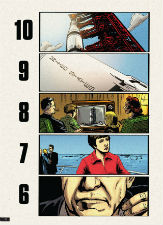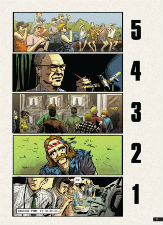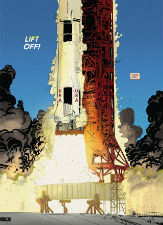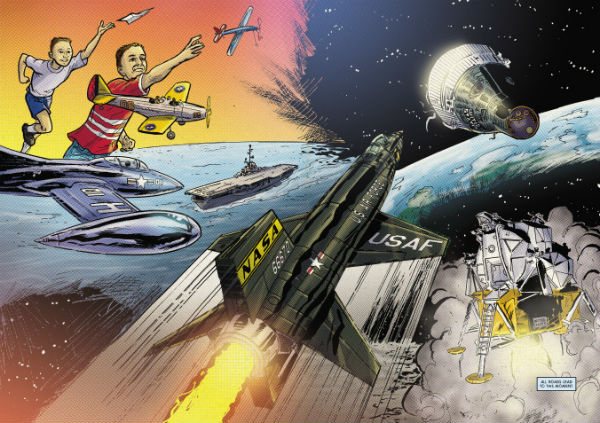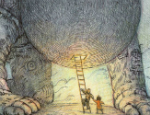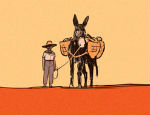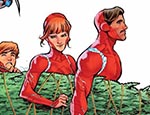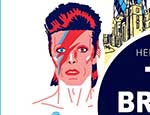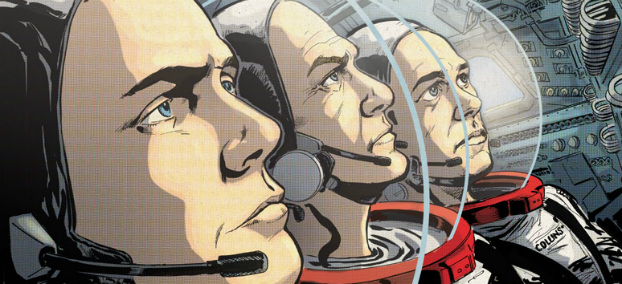
SelfMadeHero have been at the forefront of the rise of the graphic biography over the last several years, bringing the worlds of noted figures in literature, music and politics to vivid life on the comics page. It’s a strand of comics storytelling that has doubtless taken the form to new crossover audiences – Reinhard Kleist’s Nick Cave biography Mercy on Me gained notable press attention last year for example – and underlines, once again, the immediacy of the medium in bringing us directly into the experiences of others on a fundamentally empathetic level.
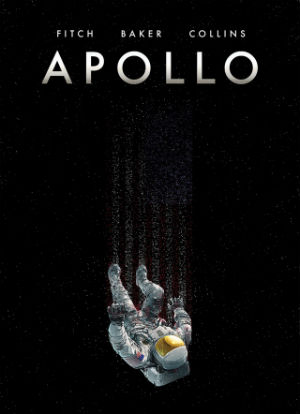 In the pages of Apollo Matt Fitch, Chris Baker and Mike Collins retell the story of arguably humanity’s greatest achievement and detail the events leading up to and surrounding that great milestone in history – the first moon landing in 1969. Writers Fitch and Baker have been steadily building up a portfolio of work through their Dead Canary Comics micropublishing outfit in recent years including books like Last Driver and Adventures in Science. Artist Mike Collins, of course, has been a part of the industry for three decades and has been involved with iconic characters at both Marvel and DC. Apollo, though, may just be the greatest work of that illustrious career to date.
In the pages of Apollo Matt Fitch, Chris Baker and Mike Collins retell the story of arguably humanity’s greatest achievement and detail the events leading up to and surrounding that great milestone in history – the first moon landing in 1969. Writers Fitch and Baker have been steadily building up a portfolio of work through their Dead Canary Comics micropublishing outfit in recent years including books like Last Driver and Adventures in Science. Artist Mike Collins, of course, has been a part of the industry for three decades and has been involved with iconic characters at both Marvel and DC. Apollo, though, may just be the greatest work of that illustrious career to date.
Apollo‘s finest achievement is in the vast range of emotions we experience via its large cast and, specifically, astronauts Neil Armstrong, Buzz Aldrin and Mike Collins. We feel their sense of trepidation, their fear, their self-doubts, their passion and, ultimately, their triumph. It’s unsurprising that the spectre of the Apollo 1 tragedy is portrayed as constantly overshadowing their endeavours. It emphasises the risk and jeopardy involved and underlines what a pioneering moment in history this was and the voyage into the unknown it represented.
Fitch and Baker make able use of Collins’s compositional skills as the team employ dream sequences, cutaways, flashbacks and metaphor to add a deeper visual resonance to the characters’ emotional journeys. From that perspective it’s important to note that, while the depth of research is obvious, Apollo is a re-creation of historical events and, as such, there’s a degree of supposition and dramatic license involved. But that also makes it a far more connective work and Fitch and Baker subtly manipulate the audience’s relationship with the cast by spotlighting both the individual stories and the incidental players, giving time to the families left behind, and jumping around across timeframes to ensure the reader more interactively immerses themself in the narrative.
Mike Collins, always the most reliable of storytellers, is a revelation here. His art is rooted in a tangible autheticity that is far more appropriate here than any flamboyant stylings would be. But, ironically perhaps, that selfsame realism also gives the book its often eerie, unsettling and dreamlike qualities as reality melts into George Melies-inspired Man in the Moon symbolism and an era-specific spirit of America is evoked to highlight how much the Apollo landing represented the zeitgeist of the time. One particular double-page spread towards the end of the book, as all strands of the narrative converge is a quite beautiful piece of storytelling that needs little accompanying exposition to put its meaning across.
Casting the moon landing into a wider cultural context with invention and resonance, Apollo is a stunning achievement. Contrasting the thirst for knowledge with the sheer humanity of the moment it’s a remarkable book from a creative team in perfect artistic synchronicity.
Matt Fitch and Chris Baker (W), Mike Collins (A) • SelfMadeHero, £15,99
Review by Andy Oliver





